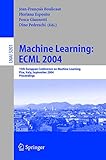Machine Learning: ECML 2004 [electronic resource] : 15th European Conference on Machine Learning, Pisa, Italy, September 20-24, 2004, Proceedings /
Material type: TextSeries: Lecture Notes in Artificial Intelligence ; 3201Publisher: Berlin, Heidelberg : Springer Berlin Heidelberg : Imprint: Springer, 2004Edition: 1st ed. 2004Description: XVIII, 582 p. online resourceContent type:
TextSeries: Lecture Notes in Artificial Intelligence ; 3201Publisher: Berlin, Heidelberg : Springer Berlin Heidelberg : Imprint: Springer, 2004Edition: 1st ed. 2004Description: XVIII, 582 p. online resourceContent type: - text
- computer
- online resource
- 9783540301158
- 006.3 23
- Q334-342
- TA347.A78
Invited Papers -- Random Matrices in Data Analysis -- Data Privacy -- Breaking Through the Syntax Barrier: Searching with Entities and Relations -- Real-World Learning with Markov Logic Networks -- Strength in Diversity: The Advance of Data Analysis -- Contributed Papers -- Filtered Reinforcement Learning -- Applying Support Vector Machines to Imbalanced Datasets -- Sensitivity Analysis of the Result in Binary Decision Trees -- A Boosting Approach to Multiple Instance Learning -- An Experimental Study of Different Approaches to Reinforcement Learning in Common Interest Stochastic Games -- Learning from Message Pairs for Automatic Email Answering -- Concept Formation in Expressive Description Logics -- Multi-level Boundary Classification for Information Extraction -- An Analysis of Stopping and Filtering Criteria for Rule Learning -- Adaptive Online Time Allocation to Search Algorithms -- Model Approximation for HEXQ Hierarchical Reinforcement Learning -- Iterative Ensemble Classification for RelationalData: A Case Study of Semantic Web Services -- Analyzing Multi-agent Reinforcement Learning Using Evolutionary Dynamics -- Experiments in Value Function Approximation with Sparse Support Vector Regression -- Constructive Induction for Classifying Time Series -- Fisher Kernels for Logical Sequences -- The Enron Corpus: A New Dataset for Email Classification Research -- Margin Maximizing Discriminant Analysis -- Multi-objective Classification with Info-Fuzzy Networks -- Improving Progressive Sampling via Meta-learning on Learning Curves -- Methods for Rule Conflict Resolution -- An Efficient Method to Estimate Labelled Sample Size for Transductive LDA(QDA/MDA) Based on Bayes Risk -- Analyzing Sensory Data Using Non-linear Preference Learning with Feature Subset Selection -- Dynamic Asset Allocation Exploiting Predictors in Reinforcement Learning Framework -- Justification-Based Selection of Training Examples for Case Base Reduction -- Using Feature Conjunctions Across Examples for Learning Pairwise Classifiers -- Feature Selection Filters Based on the Permutation Test -- Sparse Distributed Memories for On-Line Value-Based Reinforcement Learning -- Improving Random Forests -- The Principal Components Analysis of a Graph, and Its Relationships to Spectral Clustering -- Using String Kernels to Identify Famous Performers from Their Playing Style -- Associative Clustering -- Learning to Fly Simple and Robust -- Bayesian Network Methods for Traffic Flow Forecasting with Incomplete Data -- Matching Model Versus Single Model: A Study of the Requirement to Match Class Distribution Using Decision Trees -- Inducing Polynomial Equations for Regression -- Efficient Hyperkernel Learning Using Second-Order Cone Programming -- Effective Voting of Heterogeneous Classifiers -- Convergence and Divergence in Standard and Averaging Reinforcement Learning -- Document Representation for One-Class SVM -- Naive Bayesian Classifiers for Ranking -- Conditional Independence Trees -- Exploiting Unlabeled Data in Content-BasedImage Retrieval -- Population Diversity in Permutation-Based Genetic Algorithm -- Simultaneous Concept Learning of Fuzzy Rules -- Posters -- SWITCH: A Novel Approach to Ensemble Learning for Heterogeneous Data -- Estimating Attributed Central Orders -- Batch Reinforcement Learning with State Importance -- Explicit Local Models: Towards “Optimal” Optimization Algorithms -- An Intelligent Model for the Signorini Contact Problem in Belt Grinding Processes -- Cluster-Grouping: From Subgroup Discovery to Clustering.


There are no comments on this title.